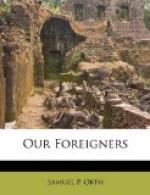Their brogue and dress provoked ridicule; their poverty often threw them upon the community; the large percentage of illiteracy among them evoked little sympathy; their inclinations towards intemperance and improvidence were not neutralized by their great good nature and open-handedness; their religion reawoke historical bitterness; their genius for politics aroused jealousy; their proclivity to unite in clubs, associations, and semi-military companies made them the objects of official suspicion; and above all, their willingness to assume the offensive, to resent instantly insult or intimidation, brought them into frequent and violent contact with their new neighbors. “America for Americans” became the battle cry of reactionaries, who organized the American or “Know-Nothing” party and sought safety at the polls. While all foreign elements were grouped together, indiscriminately, in the mind of the nativist, the Irishman unfortunately was the special object of his spleen, because he was concentrated in the cities and therefore offered a visual and concrete example of the danger of foreign mass movements, because he was a Roman Catholic and thus awakened ancient religious prejudices that had long been slumbering, and because he fought back instantly, valiantly, and vehemently.
Popular suspicion against the foreigner in America began almost as soon as immigration assumed large proportions. In 1816 conservative newspapers called attention to the new problems that the Old World was thrusting upon the New: the poverty of the foreigner, his low standard of living, his illiteracy and slovenliness, his ignorance of American ways and his unwillingness to submit to them, his clannishness, the danger of his organizing and capturing the political offices and ultimately the Government. In addition to the alarmist and the prejudiced, careful and thoughtful citizens were aroused to the danger. Unfortunately, however, religious antagonisms were aroused and, as is always the case, these differences awakened the profoundest prejudices and passions of the human heart. There were many towns in New England and in the West where Roman Catholicism was unknown except as a traditional enemy of free institutions. It is difficult to realize in these days of tolerance the feelings aroused in such communities when Catholic churches, parochial schools, and convents began to appear among them; and when the devotees of this faith displayed a genius for practical politics, instinctive distrust developed into lively suspicion.




